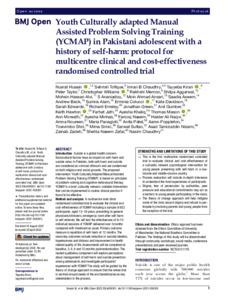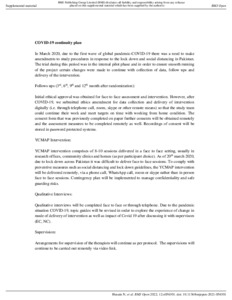HUSAIN, Nusrat, TOFIQUE, Sehrish, CHAUDHRY, Imran B, KIRAN, Tayyeba, TAYLOR, Peter, WILLIAMS, Christopher, MEMON, Rakhshi, AGGARWAL, Shilpa, ALVI, Mohsin Hassan, ANANIADOU, S., ANSARI, Moin Ahmad, ASEEM, Saadia, BECK, Andrew, ALAM, Sumira, COLUCCI, Erminia, DAVIDSON, Kate, EDWARDS, Sarah, EMSLEY, Richard, GREEN, Jonathan, GUMBER, Anil, HAWTON, Keith, JAFRI, Farhat, KHALIQ, Ayesha, MASON, Thomas, MCREATH, Ann, MINHAS, Ayesha, NAEEM, Farooq, NAQVI, Haider Ali, NOUREEN, Amna, PANAGIOTI, Maria, PATEL, Anita, POPPLETON, Aaron, SHIRI, Tinevimbo, SIMIC, Mima, SULTAN, Sarwat, NIZAMI, Asad Tamizuddin, ZADEH, Zainab, ZAFAR, Shehla Naeem and CHAUDHRY, Nasim
(2022).
Youth Culturally adapted Manual Assisted Problem Solving Training (YCMAP) in Pakistani adolescent with a history of self-harm: protocol for multicentre clinical and cost-effectiveness randomised controlled trial.
BMJ Open, 12 (5): e056301.
[Article]
Documents
30246:604407
![[thumbnail of bmjopen-2021-056301.pdf]](https://shura.shu.ac.uk/30246/1.hassmallThumbnailVersion/bmjopen-2021-056301.pdf)

Preview
30246:604457
![[thumbnail of Gumber-YouthCulturallyAdapted(Supp1).pdf]](https://shura.shu.ac.uk/30246/8.hassmallThumbnailVersion/Gumber-YouthCulturallyAdapted%28Supp1%29.pdf)

Preview
Abstract
Introduction: Suicide is a global health concern. Sociocultural factors have an impact on self-harm and suicide rates. In Pakistan, both self-harm and suicide are considered as criminal offence’s and are condemned on both religious and social grounds. The proposed intervention ‘Youth Culturally Adapted Manual Assisted Problem Solving Training (YCMAP)’ is based on principles of problem-solving and cognitive–behavioural therapy. YCMAP is a brief, culturally relevant, scalable intervention that can be implemented in routine clinical practice if found to be effective. Method and analysis: A multicentre rater blind randomised controlled trial to evaluate the clinical and cost-effectiveness of YCMAP including a sample of 652 participants, aged 12–18 years, presenting to general physicians/clinicians, emergency room after self harm or self referrals. We will test the effectiveness of 8–10 individual sessions of YCMAP delivered over 3 months compared with treatment as usual. Primary outcome measure is repetition of self-harm at 12 months. The seconday outcomes include reduction in suicidal ideation, hopelessness and distress and improvement in health related quality of life. Assessments will be completed at baseline, 3, 6, 9 and 12 months postrandomisation. The nested qualitative component will explore perceptions about management of self-harm and suicide prevention among adolescents and investigate participants’ experiences with YCMAP. The study will be guided by the theory of change approach to ensure that the whole trial is centred around needs of the end beneficiaries as key stakeholders in the process. Ethics and dissemination: Ethics approval has been obtained from the Ethics Committee of University of Manchester, the National Bioethics Committee in Pakistan. The findings of this study will be disseminated through community workshops, social media, conference presentations and peer-reviewed journals. Trial registration number: NCT04131179.
Actions (login required)
 |
View Item |



 Tools
Tools Tools
Tools